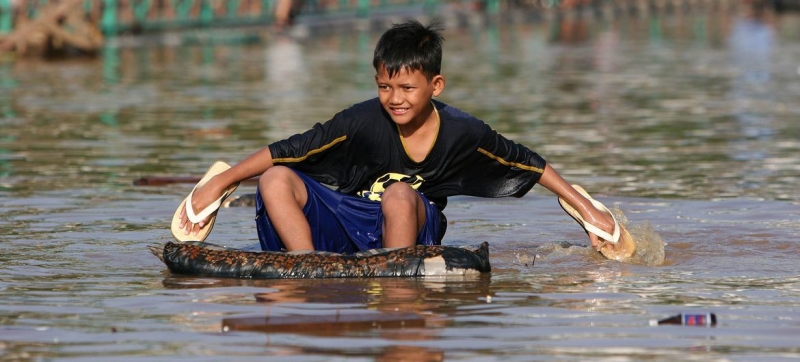
Flood in the capital of Indonesia. Advice from UNICEF experts: what to do during floods? Climate and environment
Residents of some regions of Russia and Kazakhstan are experiencing floods. Experts from the UN Children’s Fund in Kazakhstan have developed a guide for parents that will help ensure family safety during and after floods.
During floods
Listen to local authorities
Keep an eye on your local news or radio station for weather information and official notices. If you are advised to evacuate, take a kit of emergency supplies and documents. If rescuers have set up barriers, do not try to bypass them – they are there to guide people safely past dangerous areas.
Secure your home
If you have the time and ability to do so safely before evacuating, turn off all electrical appliances, turn off electricity, gas and water.
Move to elevated areas or higher floors
To avoid standing, flowing, or rising water, move to higher areas. Never attempt to walk, swim or drive over fast-moving flood water. If you are in a car and it fills with water, climb onto the roof. If you are stuck in a building, try to get to the top level and only go to the roof if necessary. Do not enter an enclosed area at the highest level of your home, such as an attic or vestibule, as this may result in you being trapped by rising flood water.
Keep children away from stagnant waters
Even a small amount of accumulated water in the basement can pose a health hazard to your child.
Keep your loved ones informed
Once you are in a safe place and have access to communications, inform your loved ones of your location.
After the floods
Listen to news and official notices
Follow notifications from local authorities and return home only after an official announcement that it is safe to do so.
Take care of your family’s health
Contaminated flood water poses many dangers to you and your family, such as water-borne diseases such as cholera and typhoid. Keep your children away from flood water as much as possible – it is likely dirty and contaminated with germs. If your children have been exposed to flood water, bathe as soon as possible and encourage children to wash their hands frequently. If you or someone in your family feels unwell, contact your doctor as soon as possible.
Stock food and water
Cover food and water to protect from contamination. Boil water from untreated sources for at least three minutes before use. Use boiled water for cooking and washing food, pots, pans and spoons or other items you use for eating. Never drink contaminated water or eat food that has been exposed to rain.
Be careful when you return home
Be careful when pumping water out of your home. Do it slowly and look out for hazards such as debris and downed electrical wires. If possible, dry as many items as possible within 24-48 hours, ventilate all areas well, and throw away anything that cannot be dried or repaired. Perhaps children should be limited in their participation in cleaning. Before children and adolescents return, all clothing and living areas must be cleaned and disinfected. Items that are heavily contaminated by flood water should be thrown away.
How to calm children after floods
Start a conversation and keep it open
- Provide opportunities for your child to talk about how they felt during the flood and encourage them to share any concerns.
- Show them that you are listening carefully and care deeply about how he is feeling.
Try to calm the child down
- Let the child understand that flooding and its consequences are not a permanent condition, and explain to him that these are natural phenomena.
- Support your child by spending as much time together as possible. Try to hug him more often.
Pay attention to signs of stress
Although many children will appear calm for a month or so after a disaster, the numbness may subside and they may begin to exhibit symptoms of trauma and stress. Some anxiety in the short term is to be expected, but if it doesn’t go away after a few months and your child experiences more severe symptoms, such as panic attacks or a desire to harm themselves or others, contact your pediatrician or psychologist right away.
Practice calming exercises together
Deep belly breathing is very beneficial, and it can be practiced with older children. If you have a younger child, you can turn this into a game: From time to time, encourage calming the mind and body by slowing down your breathing.
Try sticking to a routine
Although it can be incredibly difficult, eating and sleeping at the same time will help your child feel more confident.
